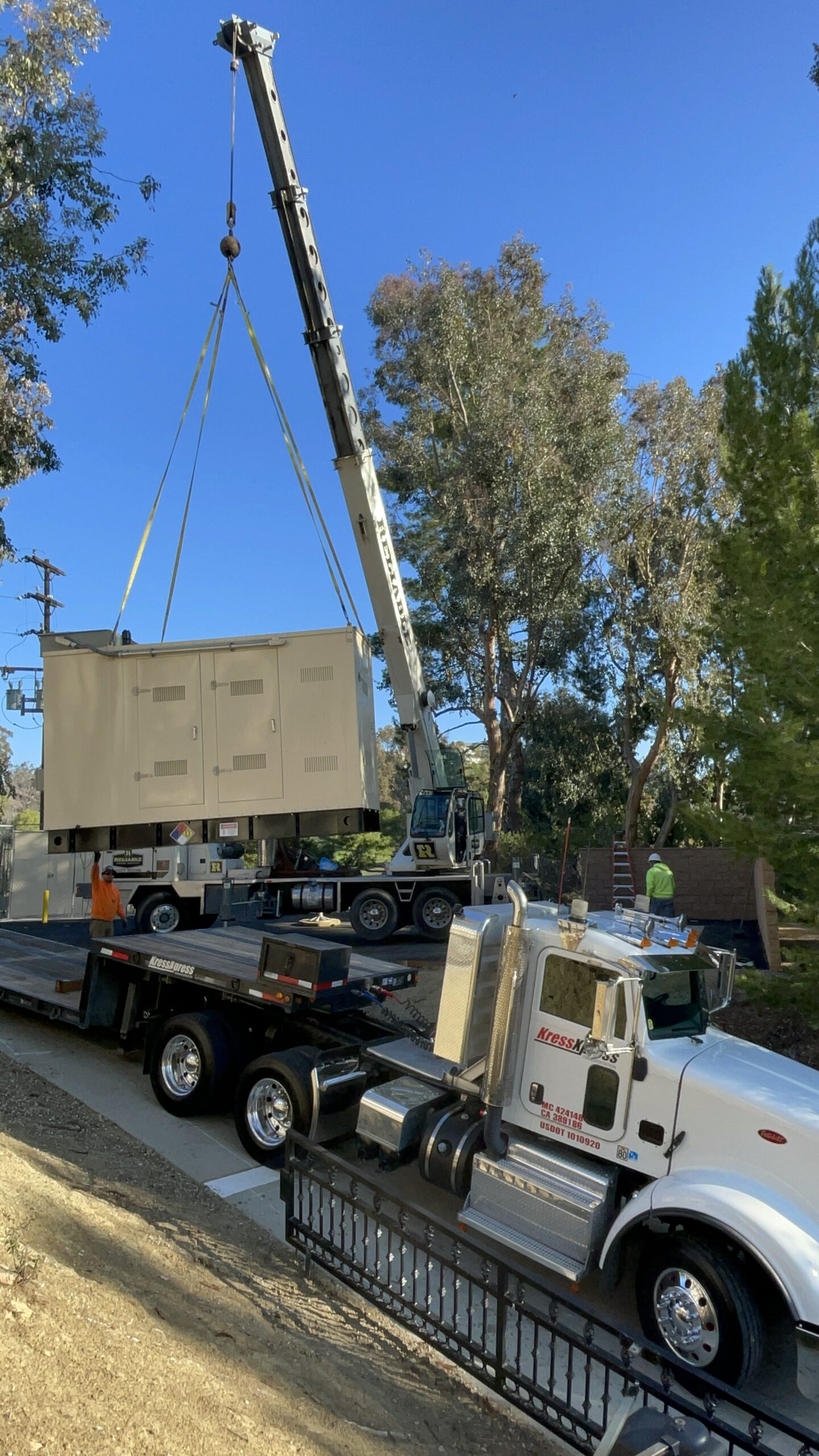Photo: New generator being hoisted into place at one of Suburban’s pump station sites. The back up generators allow us to keeping pumping water for fire fighting even when utility power is cut due down powerlines (fallen branches or trees, burned poles, etc.), a Southern California Edison (SCE) Public Safety Power Shutoff (PSPS) event, or other interruption to utility power service.
Our frontline responders are heroes, and their bravery helped my family avoid the devastating impacts of the Eaton fire. Sadly, many others were not so lucky, losing their houses and belongings. Even worse, some members of our community couldn’t escape and lost their lives. The death toll could have been much higher if utility water systems and their operators hadn’t provided crucial water to firefighters, allowing them to hold off the flames long enough for more than a hundred thousand people to evacuate to safety in the middle of the night with very little notice.
In my role as President, I am responsible for the operation of our water system, and I lie awake at night worried about whether we have done enough to keep our community safe. Water utilities like ours are always preparing for future emergencies by investing in infrastructure used to fight wildfires. These investments in California’s water systems cost money, just like other projects to install equipment necessary to remove contamination and to deliver healthy and plentiful water. By working together with partners like the Sierra Club, we can invest in fire resilience and water quality while keeping water bills affordable for the many vulnerable people we proudly serve.
Water systems provide fire protection reliability required to fight fires – ensuring residents have time to escape fast moving fires, we help extinguish burning structures and protect structures from catching fire in the first place. For example, in 2024, Suburban invested $40 million dollars to upgrade aging infrastructure like backup power, storage tanks, water sources, and water pipes that meet current and future fire flow standards to increase the reliability and fire resiliency of its system.
Additional costs come from water supply and treatment. Water systems like Suburban’s are closely regulated by the California State Water Resources Control Board – Division of Drinking Water. Water systems monitor and protect water quality by conducting thousands of samples and tests to protect customers’ short – and long-term health. Water utilities did not introduce contaminants into the water, but they are responsible for removing them. Local groundwater treatment projects cost less, are more reliable, and produce less greenhouse gases than alternative imported water sources, making them a more affordable and beneficial option. At less than a penny per gallon, utility water is the most affordable water source available to customers.
While everyone would like to pay less, customer studies have shown that most are willing to pay a little more for high-quality, reliable water service. Water utilities understand, however, that affordability is essential – especially given the challenges posed by California’s high cost of living. For customers who have trouble paying their water bills, Suburban and many other utilities provide Customer Assistance Programs (CAP) that provide monthly discounts. We strongly support the creation of a statewide low-income rate assistance program to ensure all Californians have access to essential water services, regardless of their financial circumstances. Such a program would provide much-needed support to vulnerable households while allowing water utilities to continue investing in the infrastructure and improvements necessary to ensure safe and reliable water for all.
We need to work together to support proactive and collaborative investments in water systems to enhance reliability and safety. Advancing these critical projects is essential to protecting public health and ensuring our communities are resilient in the face of growing risks like wildfire.
Recent devastating fires in our communities have proven that when facing a wall of embers, impending loss of property, or even death, customers hope the fire hydrant in front of their homes will work without questioning water affordability. Thankfully, by partnering with groups like the Sierra Club and advocating for better policy at the local and state levels, we can achieve both.
Author Bio: Craig Gott is the President of Suburban Water Systems, a regulated private water company that serves safe, reliable and affordable water to 300,000 people in east Los Angeles County. He has demonstrated state and regional leadership with chair and board director roles with water industry and business associations. Craig is currently serving as a member of the LA County Water Plan – Small, At-Risk Water Systems Task Force along with Water Committee Chair Charming Evelyn

